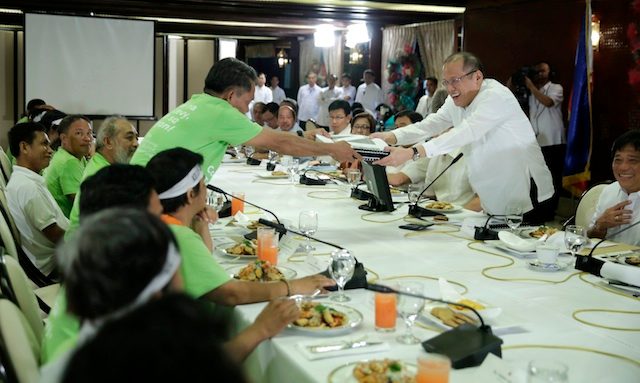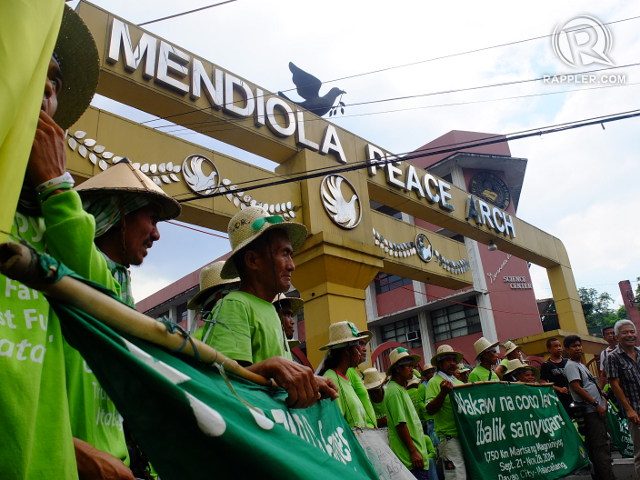SUMMARY
This is AI generated summarization, which may have errors. For context, always refer to the full article.

The President made the promise in his opening remarks at a dialogue with 24 coconut farmer leaders who had marched all the way from Davao City to meet him in Malacañang Palace.
“You will be the first to be consulted on the provisions inside this law. When there is agreement on these provisions, we will file the law in Congress and we will include it in the laws certified as urgent so that it can be passed at the soonest possible time,” he said in Filipino.
There are currently bills in both the Senate and House Representatives that aim to create a trust fund from the coco levy funds. Aquino did not specify if these would be the same bills to be certified as urgent or he plans to call for a totally new bill.
Aquino also promised to work on an Executive Order for the mobilization of the funds, while awaiting for legislation. The farmers have been demanding an EO that would create a perpetual trust fund from the P71-billion coco levy funds currently in the National Treasury.
Aquino agreed with the farmers that only the interest earned by the funds should be used for annual programs for the direct benefit of coconut farmers.
He said, however, that the proposed measures and the EO cannot take effect until the Supreme Court issues an entry of judgment into its records. Only then can its landmark 2012 decision to give the coco levy funds to farmers be final and executory.
He wants the bills, EO, and consultations with stakeholders in the coconut sector finished by the time the Court ruling becomes final and executory.
“The moment we are given the go signal to use the funds, I want the plans to be ready so that the benefits can be brought to your sector quickly,” the President told the farmers.

Aquino also emphasized that outside the coconut levy funds, the government is working on programs to improve the lives of coconut farmers and boost the coconut industry as a whole.
From a P593 million budget in 2010, the Philippine Coconut Authority was given P5.1 billion in 2013 to help the coconut farmers affected by Yolanda and the Luzon farmers who suffered from the coconut scale insect outbreak.
Other plans he is considering, he said, is the sale of United Coconut Planters Bank (UCPB) assets. The income from the sale, which will likely amount to not less than P1.1 billion, will also go to funds for the coconut sector.
Aquino agreed with the need to increase the annual income of coconut farmers, which according to the National Anti-Poverty Commission (NAPC), is only at P10,000 to P16,000 per hectare.
Sharing the sentiments of coconut sector stakeholders, the President said one solution is to diversity products of coconut farmers. Farmers who only produce copra can earn up to P250,320 per hectare per year if they delved into virgin coconut oil production and intercropped their coconut trees with banana plants.
To this end, he said the government is strengthening coconut-based farming enterprises such as coco sugar, coco coir, vinegar and other products.
Aquino met with 24 out of the 71 coconut farmers who marched more than 1,750 kilometers to demand that the coco levy funds be used for their benefit. Before arriving in Malacañang, the group visited the Supreme Court and Congress.
The P71-billion coconut levy funds represent 24% of San Miguel Corporation shares the government gave to Eduardo “Danding” Cojuangco Jr – the President’s maternal uncle – using taxes paid by coconut farmers during the Marcos administration. At the time, the farmers were told that the money would go to scholarship programs for their children and to the improvement of the coconut sector.
In 2012, the Supreme Court decided that the shares were illegally purchased and that the money should be returned to the government for programs that would directly benefit coconut farmers. But until the Court enters the judgement into its records, the decision is not yet final and executory. – Rappler.com
Add a comment
How does this make you feel?
There are no comments yet. Add your comment to start the conversation.